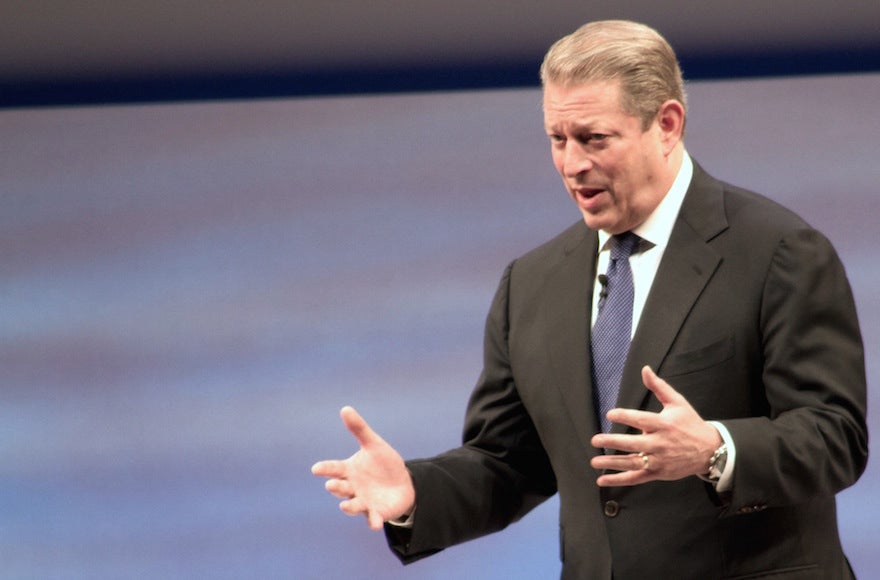Vice President Al Gore appears destined to become the next Democratic presidential nominee, but he’s apparently not taking the Jewish vote for granted.
The day before Super Tuesday, he was in New York stumping for the Jewish vote by declaring himself always and forever a friend to Israel and an enemy of terrorists. He also issued a harsh warning to the Palestinians not make unilateral pronouncements of an independent state.
Speaking to the Conference of Presidents of Major American Jewish Organizations on Monday, Gore shook his head, smiled and laughed slightly when he said that a declaration “would certainly fall in that category” of the kind of unilateral declarations that he and President Clinton have “actively and forcefully discouraged.”
He said it would be “unwise” for Palestinian Authority President Yasser Arafat to deliver on his promise to declare unilaterally a Palestinian state this fall, even if no final-status agreement with the Israelis has been reached.
Gore warned that Arafat should not assume a declaration “would have a positive outcome” for the Palestinians.
He would not elaborate on what the U.S. reaction would be to such a move, saying the scenario is still “hypothetical,” but he added that consultations with Israel would have “a great deal of influence for me.”
While the vice president broke little new ground in Monday’s appearance, he wanted to remind the Jewish community of what he believes to be his credentials on Jewish and Israel issues.
In comments and answers to questions, he addressed the list of Jewish concerns:
Transfer of weapons technology to Iran: Gore said he views “very gravely” the issue of other countries and entities sharing knowledge on weapons of mass destruction. It is “a question that potentially involves the survival of Israel, and when survival of a friend is potentially at stake, everything else is secondary.”
He said there is complete intelligence cooperation between the United States and Israel on the issue and that “there is nothing that we know about this that Israel does not now know.”
Both the U.S. House and Senate have passed a bill that would grant the president authority to impose a range of penalties, including sanctions, on countries that supply technology or equipment to Iran for use in its weapons program.
The legislation, which the American Israel Public Affairs Committee has been pressing hard for, was prompted by reports that Russian scientists, academics and companies are the top suppliers of weapons technology to Iran. The bill now goes to President Clinton, who, according to sources, has dropped his objection to the bill after working out a compromise with Congress that gives him the ability to waive the sanctions.
Gore, who has been the administration’s point man on the issue, did not say where he stands on the legislation. But he said the administration has made progress in its talks with Russia on the transfers and that there is “no higher priority” for him.
Gore also said that as president, he would continue to impose sanctions on Iran because, despite the recent elections that boosted the reformists in that country’s Parliament, the hard-line clerical leadership still runs the “national security apparatus as a terrorist apparatus,” as well as the military.
Support for Israel: Gore said that even when he served in the House for eight years, representing a district in Tennessee that was “less than one-tenth of 1 percent” Jewish, without constant advice from Jewish constituents, he cast pro- Israel votes based on “instinct.”
He repeated often that Israel is a nation that “shares our values” and that its “qualitative edge” over its neighbors should be maintained.
He said the peace process is also a process of maintaining Israel’s security. The vice president was applauded when he said, “In the Gore administration, there will be one constant — absolute, uncompromising commitment to Israel’s security.”
Thirteen Jews accused of espionage in Iran: He said the planned April trial of the Jews, who Iran says spied for Israel and the United States, should serve as a test of the seriousness of the reform movement in Iran. Even the words “reform” and “moderate,” Gore said, should be treated with skepticism when it comes to Iran, because they are relative terms.
“Even so-called reformers have made statements that have been awful,” the vice president said.
Moving the U.S. Embassy to Jerusalem: Gore said the issue has to be approached within the context of a final peace deal between Israel and the Palestinians.
He said the United States does not want to lose its credibility as a facilitator in the peace process, but suggested the move of the embassy from Tel Aviv is likely, saying, “The outcome I think is hardly in doubt, and my desires are the same as your desires.”
Charitable choice: Gore has faced criticism from some Jewish organizations for his proposal to expand a controversial charitable choice program that gives federal money to religious organizations.
Under the “New Partnership” program Gore has proposed, religious institutions could receive federal funds for drug treatment programs, services for the homeless and initiatives to combat youth violence “without having to alter the religious character that is so often the key to their effectiveness.”
Gore emphasized that he supports the strict separation of church and state. The vice president was applauded when he said that any charitable choice program that gives money to a religious institution should also include a secular alternative and that there must be a prohibition against public funds used for any particularly religious function.
JTA has documented Jewish history in real-time for over a century. Keep our journalism strong by joining us in supporting independent, award-winning reporting.
The Archive of the Jewish Telegraphic Agency includes articles published from 1923 to 2008. Archive stories reflect the journalistic standards and practices of the time they were published.




